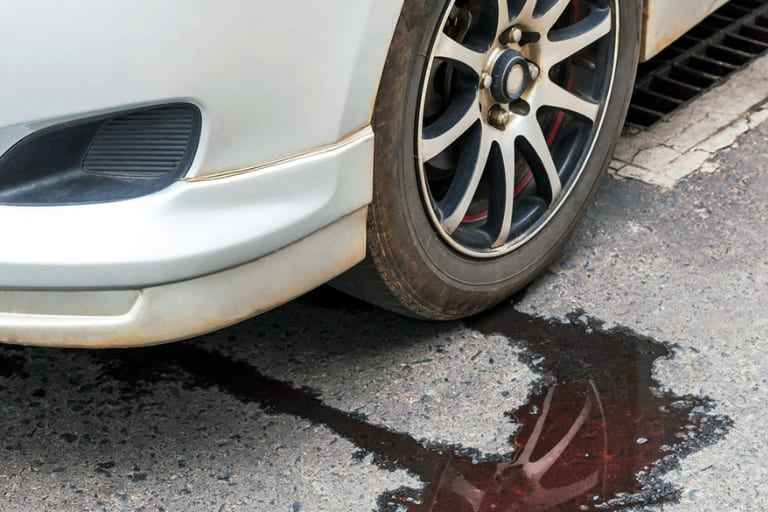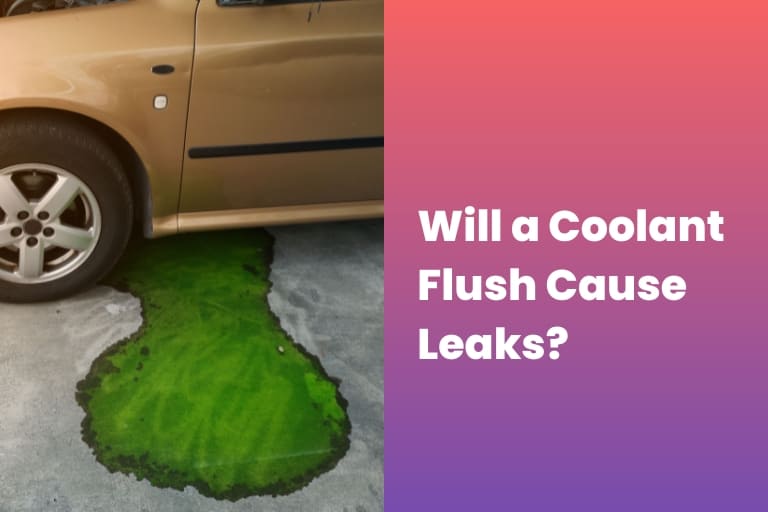Did you know many car owners neglect to maintain their vehicle’s coolant system properly?
That’s a lot of people who could be putting their cars at risk for leaks and other problems!
And, if you’re one of those who’s been neglecting your coolant system, you might be wondering if a coolant flush could cause leaks.
Well, I’ve been there too. I used to think flushing my coolant would lead to more problems.
But, after researching and talking to experts, a coolant flush is a crucial step in preventing leaks and keeping your engine running smoothly.
In this post, we’re going to dive into the topic of coolant flushes and answer all of your questions, such as:
- Will a coolant flush cause leaks?
- Impact of Coolant Flush on Leaks
- How to minimize leaks of coolant?
So, let’s get started and learn everything you need about coolant flushes and leaks!
Contents
Can Coolant Flush Cause Leaks?

No. A coolant flush typically won’t cause leaks. It can help prevent leaks by removing contaminants, rust, and corrosion from the coolant system. A coolant flush is like deep cleaning your engine, keeping it in top condition and preventing leaks.
Common causes of coolant leaks
Coolant leaks are a common problem that can damage your driving experience. But the good news is that they’re often caused by simple things that can be easily fixed.
Here are some of the most common causes of coolant leaks:
- Worn or damaged hoses and connections: Just like the pipes in your home, your car’s hoses and connections can become worn over time and start to leak.
- Faulty gaskets and seals: Gaskets and seals are responsible for keeping your coolant system sealed up tight. When they start to deteriorate, coolant can start to leak.
- Leaky water pump or radiator: The water pump and radiator play a crucial role in your coolant system. If they start to leak, you’ll notice coolant dripping from under your car.
- Corroded or rusted parts: Like a rusty pipe, corroded or rusted parts can cause leaks in your coolant system.
Don’t let coolant leaks ruin your day. These are some of the most common causes of coolant leaks, but there can be others. To keep your engine running smoothly and avoid leaks, it’s essential to have regular maintenance checks and to address any leaks as soon as they’re noticed.
Impact of a Coolant Flush on Leaks
We have discussed many things, but what about a coolant flush and its impact on leaks? Well, a coolant flush can help prevent leaks from happening.
A. Coolant Flush Can Prevent Leaks: By removing contaminants and debris from your coolant system, a coolant flush helps to keep everything running smoothly and prevent leaks from occurring. Fresh, clean coolant can also extend the life of your engine and prevent corrosion and rust from damaging the metal parts.
B. Coolant Flush can identify and help fix existing leaks: During a coolant flush, a technician can inspect the system for any leaks. If they find any, they can fix them then and there or recommend repairs to prevent further issues.
C. Potential Risks: While a coolant flush is a safe and beneficial process, it’s essential to have it done by a qualified technician. If the technician doesn’t perform the flush properly or the coolant system isn’t in good condition, there is a risk of leaks.
In other cases, if the coolant system is not in good condition or the flushing process is not performed correctly, it can lead to leaks. For instance, if a hose becomes damaged during flushing, it can lead to a leak.
D. Importance of Good Coolant System: It is crucial to ensure the coolant system is in good condition before having a coolant flush. Check for any visible leaks or damage, and address them before the flush. This will help prevent leaks from occurring during the flush and keep your engine running smoothly for longer.
A coolant flush can prevent leaks and keep your engine running smoothly. Regular maintenance and checks of the coolant system can help you avoid costly repairs and extend the life of your vehicle. So, give your engine the TLC ()it deserves, and keep those leaks at bay!
How to Prevent Coolant Leaks?
Ah, coolant leaks, the bane of every car owner’s existence. Luckily, with a few simple steps, you can prevent them from happening.
Here are a few things you can do to keep your coolant system leak-free:
1. Regularly inspect the coolant system for leaks
Regular inspections can help you catch leaks before they become more significant problems. Look at your hoses, connections, gaskets, and seals, and ensure they’re all in good condition.
2. Fix Leaks in The Coolant System Promptly
If you do spot a leak, don’t ignore it. Get it fixed right away! It’s essential to fix any leaks in your coolant system as soon as you notice them. Prompt action can prevent major problems and help keep your engine running smoothly.
So, look for any signs of a leak, such as low coolant levels, puddles under your vehicle, or warning lights on your dashboard, and address them immediately.
Also, Check: Can Low Coolant Level Cause Check Engine Light?
3. Flush the coolant system periodically
A regular coolant flush can keep your coolant system clean and functioning correctly. It can also help prevent leaks by removing contaminants that have built up over time.
4. Use the correct type of coolant
Make sure you’re using the right type of coolant for your engine. Different engines require different types of coolant; using the wrong type could lead to leaks and other problems.
5. Regularly maintain the vehicle
Regular maintenance is key to keeping your vehicle running smoothly and avoiding leaks. Make sure to follow your manufacturer’s maintenance schedule and address any issues.
Following these simple steps, you can keep your coolant system leak-free and your engine running smoothly for years!
You May Also Like the following:
- 9 Signs You Need a Coolant Flush
- Why Is the Air Compressor Pushing Coolant Out?
- Coolant Under Pressure When Cold
- Does the Coolant Level Drop When The Engine Is Cold?
- Coolant Coming Out of the Overflow
- Can You Put Ice in Your Coolant?
- What Happens if You Don’t Flush Coolant?
- No Coolant in the Radiator, but Reservoir Tank is Full
- Do Cars Lose Coolant Over Time?
- Does Coolant Evaporate?
- Is Inverter Coolant the Same as Engine Coolant?
- Coolant Coming Out of the Radiator Cap When Removed
FAQs
Can a Coolant Flush Cause Problems?
Indeed, performing a coolant flush on your radiator can lead to issues. It may remove particles that can obstruct the engine or cause damage to the radiator, such as cracks or leaks. While the advantages of a radiator flush typically surpass the potential risks, a radiator flush can harm your vehicle.
Can a Coolant Flush Damage Your Water Pump?
No, a coolant flush does not damage your water pump. It can reduce the likelihood of water pump failure. As the corrosion inhibitors in your coolant deteriorate over time, rust can form around the impeller, shortening the pump’s lifespan. A coolant flush can help remove this rust and prevent further damage, ultimately extending the life of your water pump.
What happens after a coolant flush?
Certainly, a coolant flush has the potential to enhance your car’s performance by promoting a stable operating temperature and safeguarding your engine against overheating. Additionally, by removing harmful contaminants and preventing corrosion buildup in the cooling system, a coolant flush can help safeguard essential engine components and ultimately prolong the lifespan of your vehicle.
Conclusion
In conclusion, the key points discussed include maintaining a proper coolant system in your vehicle. A coolant leak can lead to several issues, including overheating and engine damage, which can be costly. Preventing leaks is crucial for the health and longevity of your vehicle’s engine.
The coolant system flush is a crucial maintenance task that a professional should only perform. A professional will have the necessary tools, knowledge, and experience to flush the system properly, ensuring its safety and preventing unintended issues.
Regarding final thoughts and recommendations, watch for any signs of coolant leaks, such as low coolant levels, a sweet smell, or visible leaks under the car. Regular maintenance, including coolant flushes, will help prevent leaks and keep your vehicle running smoothly.
Thus, maintaining a proper coolant system is essential for the health and longevity of your vehicle’s engine. Regular maintenance, including coolant flushes and seeking professional service when necessary, can ensure safety and prevent unintended issues with the coolant system.
